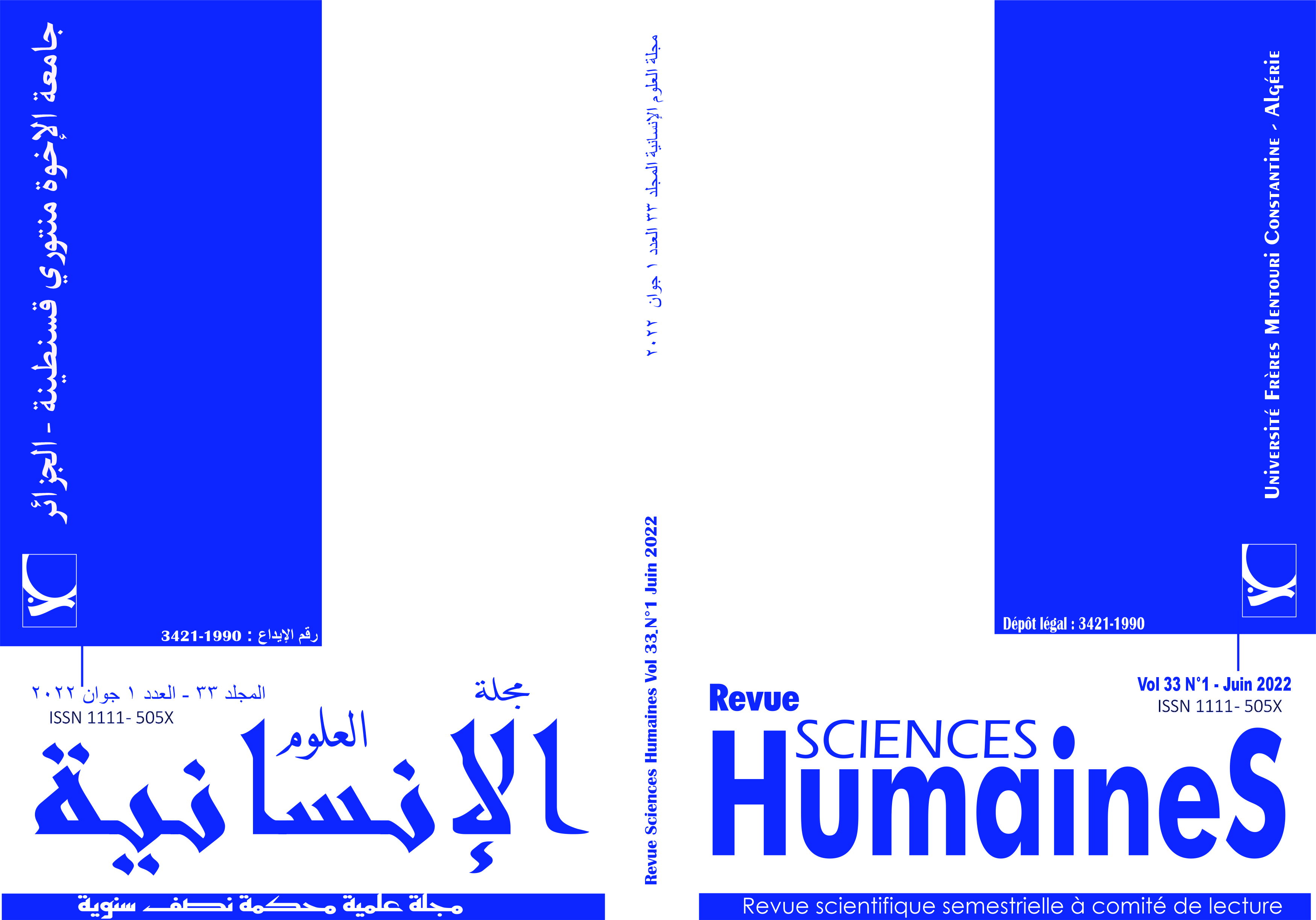Cheating in exams and the attribution of the failure and success among university students
Keywords:
causal attribution, academic failure and success, exams’s cheatingAbstract
This study aimed to find out the category of factors that university students attribute to their academic failure and an attempt to resort to the process of cheating in exams.
For this reason, we applied a semi-directed interview to an intentional sample consisting of 15 male and female students who tried or actually practiced cheating during their university course, and who are pursuing their studies in the first year of a master’s degree at the Faculty of Psychology and Education Sciences at the University of Constantine 2.
By using the Berlson method to analyze the content of the responses of the members of the research sample, we reached the following results: A large percentage of students attributed their failure to internal factors that are insufficient efforts, lack of achievement motivation, inability to understand because of the lacking of the processes of attention and concentration in lessons, which lead to forgetting information. And all of this may have a direct contribution in pushing them to exam's cheating for maintaining a high level of self-esteem.
Downloads
References
(1) Weiner.B, Frieze,I, Kukla A., Reed.L, Rest.S et Ronsenbaum,R.M. (1971)."Perceiving the Causes of Success and Failure", General learning Press, p1-26. retrieved from https://www.researchgate.net/publication/232428593.
(2) Deschamps, J.C, et Clémence,A.(2000)." L’explication Quotidienne. Perspectives psychologiques". France : Presses universitaires de Rennes.p11
(3) De Landsheere, G.(1979). "Dictionnaire de l’évaluation et de la recherche en éducation", 2éme édition, Paris: Presses Universitaires De France.p91
(4) عبد الله بن طه الصافي،(2000)، عزو النجاح والفشل الدراسي وعلاقته بدافعية الانجاز.(دراسة على عينة من طلاب الجامعة المتفوقين والمتأخرين دراسيا بمدينة أبها). مجلة جامعة أم القرى للعلوم التربوية والاجتماعية والانسانية، العدد 2، المجلد 12، مكة المكرمة: جامعة ام القرى: ص80- 106.
(5) فيصل محمد خير الزراد،(2002)، ظاهرة الغش في الاختبارات الأكاديمية لدى طلبة المدارس والجامعات (التشخيص وأساليب الوقاية والعلاج)، د ط، الرياض، دار المريخ للنشر ، ص20.
(6) Bouchard ,P ,et St-Amant, J.(1996). "Le retour aux études: les factures de réussite dans quatre écoles spécialisées au Québec", Revue canadienne de l’éducation , N)1(21, p 1-17.
(7) محمد السيد عبد الرحمان،( 1998)، دراسات في الصحة النفسية (التوافق الزواجي- فعالية الذات- الاضطرابات النفسية والسلوكية)، ط1، دار قباء للطباعة والنشر والتوزيع،.القاهرة، ص96
(8) خالد نور الدين، وسليمة طاجين ، رادية بوشيبة، (1998)، أنماط الانساب والنجاح المدرسي، مجلة علم النفس، الجمعية الجزائرية للبحث في علم النفس، الجزائر: العدد7، ص1-40 .
(9) رجاء وحيد دويدري،(2002)، البحث العلمي أساسيته النظرية وممارسته العلمية، ط1، سوريا، دار الفكر، ص 183
(10) موريس أنجرس،(2006)، منهجية البحث العلمي في العلوم الانسانية-تدريبات عملية-.(بوزيد صحراوي، كمال بوشرف، سعيد سبعون، المترجمون)، الجزائر، دار القصبة للنشر، ص 218
(11) Bardin, L. (1977). Análise de conteúdo. trad. Luís Antero Reto e Augusto Pinheiro, Portugal :édition Capa 70.p 117
(12) موريس انجرس ،(2006)، مرجع سبق ذكره، ص279
(13) داود بورقيبة، (2004)، الإمتحانات في منظومتنا التربوية الجامعية واقعها وما يجب أن تكون عليه، سلسلة إصدارات مخبر إدارة وتنمية الموارد البشرية، العدد 1، سطيف: جامعة فرحات عباس، ص 371 -377.
(14) Legendre,R.)2002(. "Stop aux réformes scolaires", Montréal: Guerin.p02
(15) سليمة سايحي ،(2012)، قلق الامتحان وبعض العوامل المساعدة لظهوره لدى التلاميذ، مجلة الباحث في العلوم الانسانية والاجتماعية، العدد7، بسكرة: جامعة محمد خيضر، ص 74-89.
(16) ده مير، عادل محمود نورجان،(2014)، المهارات المعينة على الاستذكار والتعلم وعلاقتها بدافعية التعلم، ط1، العراق، دار الكتب والوثائق القومية، ص10
(17) فيص خير الزراد (2002)، مرجع سبق ذكره.
(18) نور الدين وآخرون، (1998)، مرجع سبق ذكره، ص34-35.
(19) نبيل محمد زايد،(2003)، الدافعية والتعلم، ط1،القاهرة، مكتبة النهضة المصرية، ص91.
(20) زكرى لورنس بسطا، اعتدال بنت عبد الرحمن حجازي،(2012)، الغش في الامتحانات أسبابه- نتائجه- مقترحات للحد منه، جزء1، الاسكندرية، المكتب الجامعي الحديث، ص24
(21) لجنة الترجمة والاعداد،(2005)، الامتحانات وطرائق مواجهتها، طريقك للتفوق والذاكرة الفعالة، ط1، الامارات العربية المتحدة، دار الكتاب الجامعي.
(22) زهية خطار، شهرزاد بوشدوب،(2016)، دور الشعور بالمسؤولية الاجتماعية في التخفيض من ظاهرة الغش في الامتحانات لدى طلاب الجامعة، مجلة دراسات، العدد41، الاغواط: جامعة الاغواط، ص84-100 تم استعادته من: search.mandumah.com/Record/763061//:http
(23) لطيفة حسين الكندري،(2010)، ظاهرة الغش في الاختبارات أسبابها، أشكالها من منظور الطلبة كلية التربية الأساسية في دولة الكويت، بحث ممول من الهيئة العامة للتعليم التطبيقي والتدريب. الكويت: جامعة الكويت، ص 1-39 تم استعادته من https://www.latefah.net/artic2/kash.pdf
(24) نفس المرجع السابق، ص23
(25) Guénard. F.(2012)." La Fabrique des Tricheurs: la Fraude aux examens expliquée au ministre, aux parents et aux professeurs". Paris: )JC( Gawsewitch. p72
Downloads
Published
Issue
Section
License

This work is licensed under a Creative Commons Attribution-NonCommercial-NoDerivatives 4.0 International License.












